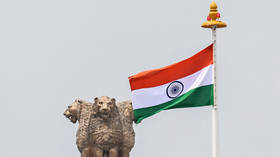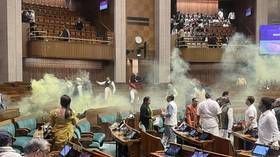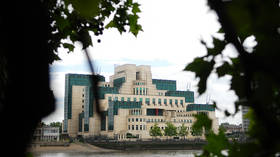‘Mastermind’ behind Indian Parliament attack surrenders to police

The suspected mastermind behind an attack on the Indian Parliament surrendered to police in New Delhi on Thursday. Lalit Jha told officers that he had filmed his accomplices releasing smoke on the premises on Wednesday and had sent the footage to an associate in Kolkata before fleeing the scene, according to reports.
Jha, a Kolkata-based teacher, has been transferred to a Special Cell of the Delhi Police for further questioning. He is reportedly associated with several NGOs in the West Bengal state, and has been described in various media reports as a “quiet man” and a “social activist.” On Friday evening, the Patiala House Court in Delhi sent the alleged mastermind to police custody for seven days.
On Wednesday, two of Jha’s alleged accomplices stormed the parliament with smoke canisters, while another two remained outside and released yellow smoke. The four suspected infiltrators – Sagar Sharma and D Manoranjan inside parliament, and Neelam Devi and Amol Shinde outside the building – have been charged with terrorism under the stringent Unlawful Activities (Prevention) Act (UAPA) and have been remanded in police custody for a week.
The incident came on the anniversary of the 2001 attack on the Indian Parliament in which six police personnel, two parliamentary security staff, and a gardener were killed, as well as five terrorists. Hindustan Times reported that the suspects in this week’s attack were associated through a social media page called ‘Bhagat Singh Fan Club’, and had met in Mysuru in the southern Karnataka state around 18 months ago. Bhagat Singh was an Indian revolutionary who was hanged in 1931 for killing an officer of the British colonial government.
While claiming custody of the quartet to a court, the Delhi Police said the group had posted pamphlets on social media that described Prime Minister Narendra Modi as a “missing person” and “proclaimed offender.” According to police, the suspects had bought shoes with cavities from Lucknow in Uttar Pradesh to conceal the gas canisters they released on the day of the attack.
The men entered the parliament as “guest visitors” using a letter issued by the office of Prathap Simha, an MP from the ruling Bharatiya Janata Party (BJP). In response to the opposition’s calls for an investigation, Simha said he had been entirely unaware of the men’s plans when his office issued the passes.
In the aftermath of the incident, eight security personnel were suspended by the Lok Sabha Secretariat, which is responsible for security arrangements. Parliament Speaker Om Birla has announced a high-level probe while noting that the smoke from the canisters had been “harmless” and “not a cause of worry.”
The breach, which a police source described to India Today as “well-planned,” notably occurred on the anniversary of the December 13, 2001, terrorist attack on the parliament. The suspects had a similar “ideology” and wanted to draw public attention to their act, sources further informed the outlet.
During interrogation, the accused said they were “upset” due to issues such as the farmers’ protest, the ethnic conflict in Manipur state, and unemployment. In 2020-21, farmers in India launched a massive protest opposing three farm acts that the parliament passed. They eventually called off their action after the federal government sent them a letter accepting most of their demands.
The conflict in Manipur is an ethnic clash between the two major communities in the state, the Kukis and Meiteis, which has killed several hundred and rendered thousands homeless.














